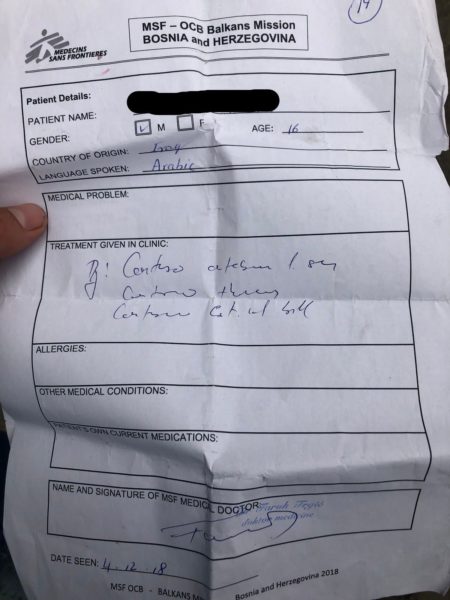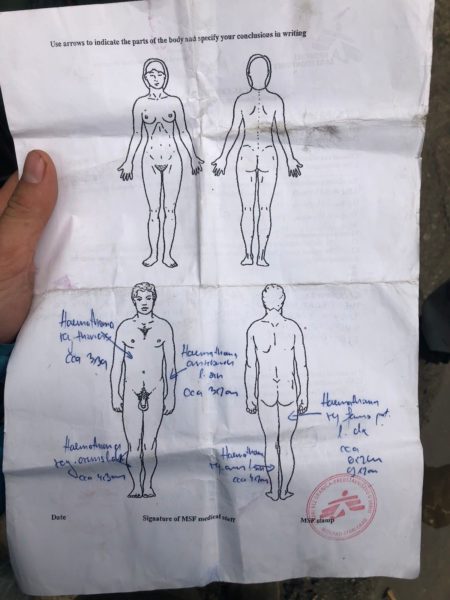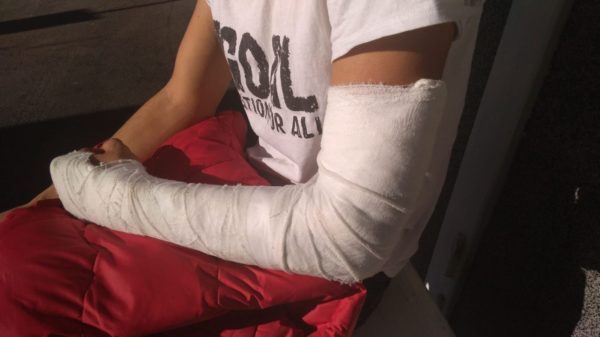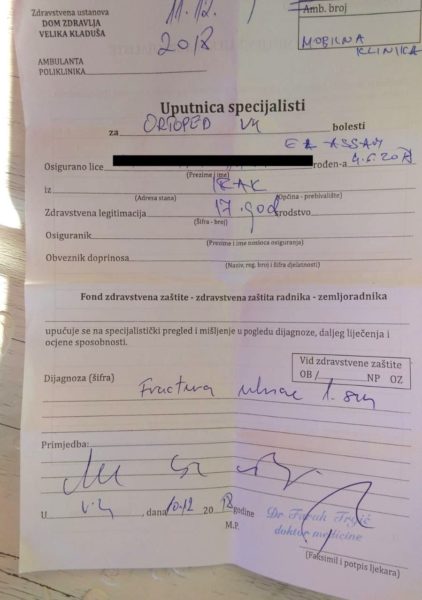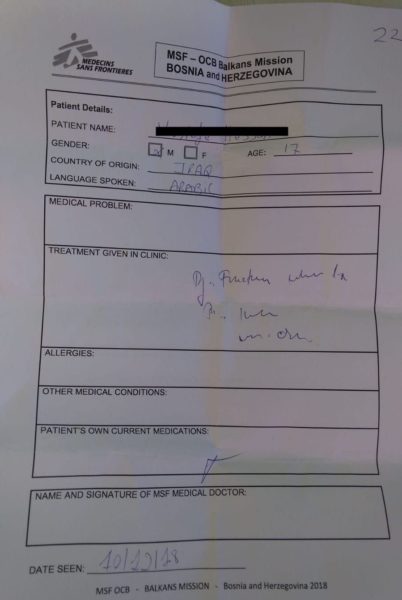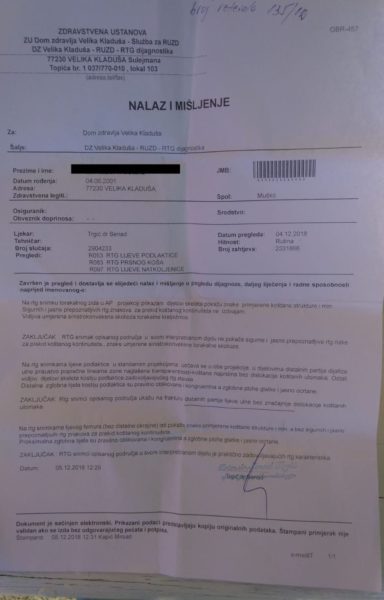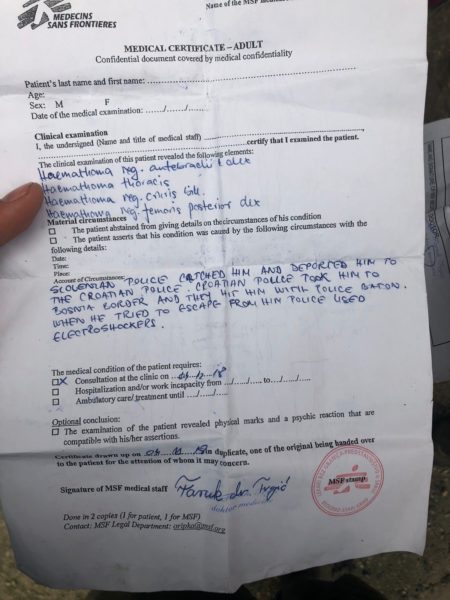Around November 25, 2018, the 17-year-old boy left Velika Kladuša (BIH) by foot with a family of five from Iraq and one other male. The family consisted of a father, a mother, and two minors under the age of 10. The respondent‘s arrangement with the family was that if the authorities would catch them, they would all say that he was the brother of the mother.
After walking for eight days through Croatia, they crossed the Slovenian border on the afternoon of December 2. The six of them walked for an additionally two or three hours when they encountered eight Slovenian officers, approximately 5 km away from the border. Intentionally, the group had tried to approach the officers as the family was very tired and wanted to apply for asylum in Slovenia. The family’s intention was to be taken to a camp in Slovenia, so they wanted to get the attention of the police. When they saw two police cars parked along the road from their position in a forest, the respondent approached them, heading towards the cars to alert them of his group’s presence.
The officers present didn’t speak much to the group since none of the people on the move spoke English well. After a while, a van arrived and the group was driven for approximately 30 minutes to a police station. At this police station, one of the children who spoke some English told the officers that they were hungry and shortly after, an officer arrived with biscuits and water for everyone in the group.
Afterwards, a translator entered and the family was taken into one room together, while the respondent was taken along with the other single male to another room. The translator was Palestinian with brunette hair, approximately 180 cm tall, having a shaved face, being approximately 45-years-old, and having tan skin. At some point during the respondent’s interaction with this translator, the individual reported that he had an affiliation to Christianity.
At some point during the group’s time at the police station, the informal arrangement which had been reached between the group members, that they would inform the authorities about the respondent being part of their family, began to break down. The eight of them were interviewed individually and while the respondent informed the officers that he was part of the family, the mother in the family reported that she was not related to him. Though, the family reported to the officers that the other single male was part of their family, but not the respondent. He previously had his fingerprints taken by officers in Slovenian, and supposes that this might have been the reason why the family wanted to distance themselves from him.
When the respondent had to speak to the translator, he was taken to a long room with four computers inside. There were four officers present, one who the respondent described as a “sergeant”. The respondent was seated next to a table which had a computer on it. There was a fingerprint scanner next to the computer and a camera positioned next to him. During his interview with the translator, his right index finger was scanned by the machine. Likewise, he said the camera recorded their interview. Positioned in front of him on either side were the translator and one officer.
When the respondent began to talk to the translator, he was asked:
“Why did you come to Slovenia?”
– “I want asylum.”
“You are a liar! You are [just] saying [you] want asylum here. When we take you to the camp in Ljubljana, you [will just] go to Trieste or Germany.”
From this point, the translator began to accuse the respondent of lying about his age and telling him that he was not a minor:
“l can’t register you as a minor because l see your body, l see your face, [ and it’s too] big.”
He was several times told that he was a liar, as he was not related to the family and wrongfully assumed he was not a minor. Aside from this, he was asked general identification questions during their interview, such as his country of origin, but he wasn´t given any papers to sign:
“They didn’t give me any papers. They had my case, just my case with my photo and with my [finger]print.”
He then was detained for nine hours at the police station before he was driven for an hour in a van, in which he was the only passenger. They arrived at another location in Slovenia at around 1 am, which he described as a prison:
“They took just me. Alone.”
At the entrance, his shoes and socks were taken from him, and he was then led barefoot into a prison cell with the number 8. The cell had a toilet, a sink, one small window and a bed which he slept on. He was the only person in his cell and remembered that when he arrived he was very hungry and therefore asked the officers if they could bring him any food, but never got any.
He stayed in the prison until the next half day before he was taken with a van to Slovenia, along with six Algerian people on the move and one person from Yemen.
He was then handed over to the Croatian authorities at a place which looked like an official border checkpoint. The Slovenian officers also handed over a bag with his phone and money to the Croatian authorities, but he never received it back. The now seven of them were held in a small room at this checkpoint for approximately seven to nine hours. This small room was just one of many rooms in the complex. He had to give his thumbprint and in addition, he had to write down his name on a piece of paper and hold it in front of his chest while a photo was taken. Until that point, he had still not eaten and reiterated to these new officers that he was hungry. They brought him some water, biscuits, and meat to eat.
The respondent supposes, that the seven of them were being kept at the border checkpoint to wait for the nighttime. After it was dark, around 8-10 pm, a van arrived, and they were driven for around 1,5 hours to a secluded area at the Bosnian−Croatian border, approximately 27 kilometers from Velika Kladuša.
At the border, the seven of them had to get off the van one by one. The officers would open the door, take one of the individuals out, close the door, and push them back to the Bosnian side of the border. During this period, the respondent could hear the others crying out loud every time they were hit by batons. This process then was repeated until only the respondent was left in the van. He had been listening to the screams of the other individuals and was scared to get off the van.
When he finally exited the van, he faced approximately twelve officers positioned in two lines leading to the border. Each of them was wearing black balaclavas and headlamps on their foreheads which blinded his eyes, and prevented him from seeing any distinguishing characteristics of the officers. He reported being hit by the first two with batons, forcing him to move forwards towards the other officers who hit him on his arms, shoulders, chest, and face. As he progressed down the line, the sixth officer took out a square shaped device which fit into his hand. He pushed it into the respondent’s chest, giving him an electric shock.
“After [the electric shock], l didn’t see anything. l was like asleep…like dreaming.”
He then reported that one of the officers threw water onto his face from a bottle which woke him up.
“When l woke up, the police hurt me in my hand and in my face.”
He tried to protect his face and head from several baton strikes with his hand and was hit several times on the forearm as a result. He would later find out that these strikes broke his forearm twice.
“Au, my arm!”
And the officers continued hitting him with batons on his legs instead. He also recalled receiving at least one direct punch from a closed fist to his face. At some point during the push-back, he fell down:
“After the police hurt me, l couldn´t walk. I was crawling on the ground and when the police saw me, they came to me and started kicking me in the legs.”
During this attack, the officers kept his phone, along with €250, and explained to him that this was the price of entering Croatia illegally.
Finally, he made it to the Bosnian side of the border, but the other six individuals who were pushed-back before him hadn’t waited for him. He reported that he waited in the forest on the Bosnian side of the border for an hour, just sitting by himself to recover. When he got up and began walking, he saw a house which he approached and spoke to the owners. He told them that he needed help and asked if they would bring him to a hospital.
“They didn’t listen to me. They said: Go! Go!”
So he walked back the 27 km to Velika Kladuša (BIH) on his own, which took him around seven hours.
